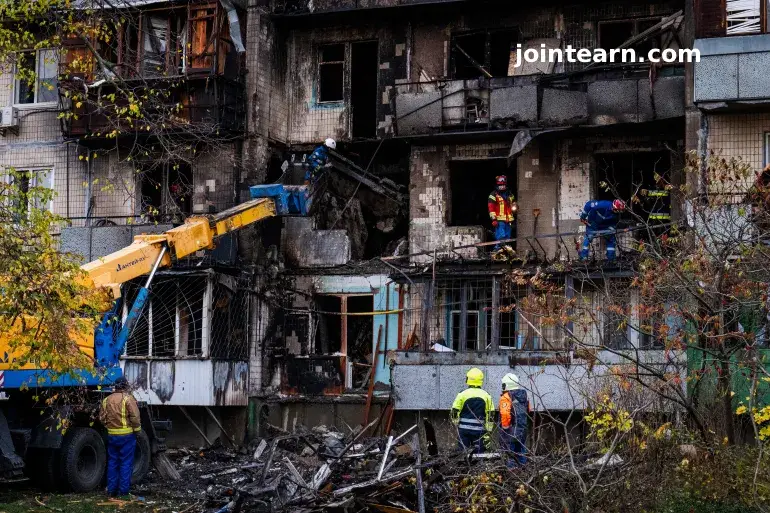
At least three people were killed and 27 others wounded, including six children, in a massive overnight Russian drone assault on Kyiv, according to Ukrainian officials. The deadly strike — one of the most intense in recent months — comes as Russia’s full-scale invasion of Ukraine nears its fourth anniversary, and President Vladimir Putin claims successful final testing of a new nuclear-powered cruise missile with “unlimited range.”
Russia Launches Deadly Drone Barrage on Kyiv
Kyiv Mayor Vitali Klitschko confirmed the casualties early Sunday, warning residents to stay in shelters during the barrage that lasted nearly 90 minutes.
“According to preliminary information, three people died and 27 were wounded (including six children),” Klitschko said on Telegram. “All have received medical assistance, and several remain hospitalized.”
The Desnyansky district, in northeastern Kyiv, was among the hardest hit. Drone fragments ignited fires in a nine-storey residential building, with flames spreading across multiple floors before firefighters brought them under control. Nearby, another apartment complex was heavily damaged, and five residents were rescued from the wreckage.
In the Obolonsky district of northern Kyiv, debris struck a 16-storey building, damaging several apartments. “There are no structural collapses or ongoing fires,” Klitschko added.
The Ukrainian Air Force said air raid sirens sounded across the capital and surrounding regions for about 90 minutes before the alert was lifted around 2:30am (00:30 GMT). Officials have yet to confirm the total number of drones used in the attack, but early reports suggest a large-scale swarm targeting civilian areas.
Growing Civilian Toll as War Nears Fourth Year
The latest assault follows a string of Russian attacks that have killed and wounded dozens across Ukraine in recent days. Just 24 hours earlier, another wave of drone and missile strikes killed four people, two of them in Kyiv, according to Ukrainian authorities.
Although both Moscow and Kyiv deny intentionally targeting civilians, international observers report that thousands of civilians have died since Russia launched its full-scale invasion in February 2022. Millions more have been displaced, and large parts of Ukraine’s energy and housing infrastructure have been devastated.
Putin Announces “Successful Final Test” of Nuclear-Powered Burevestnik Missile
In a separate development that heightened global tensions, Russian President Vladimir Putin announced that Moscow had successfully completed the final test of the Burevestnik nuclear-powered cruise missile, a weapon he described as having “unlimited range” and capabilities beyond any system in the world.
“Decisive tests are now complete,” Putin declared during a meeting with top military officials broadcast by Russian state media. He ordered preparations to deploy the weapon into active service, hailing it as a “unique creation that no one else in the world possesses.”
According to Russia’s Chief of General Staff Valery Gerasimov, the missile flew for more than 15 hours, covering 14,000km (8,700 miles) during its most recent test — and still did not reach its maximum operational range.
Putin first announced the Burevestnik’s development in 2018, claiming it would evade all Western defense systems. The latest revelation signals a renewed emphasis on nuclear deterrence as Russia faces growing Western sanctions and diplomatic isolation over the ongoing war in Ukraine.
US and EU Sanctions Escalate as Putin Rejects Western Pressure
Putin’s announcement came as the United States and the European Union unveiled new sanctions aimed at crippling Russia’s war economy, targeting its energy exports, defense supply chains, and financial systems.
Despite the economic strain, Putin remained defiant, calling Western sanctions “an unfriendly act.”
“No self-respecting country and no self-respecting people ever decide anything under pressure,” he said.
Meanwhile, US President Donald Trump downplayed the likelihood of a direct meeting with Putin to negotiate an end to the war. Speaking on Saturday, Trump said he was “not going to be wasting [his] time,” although sources told AFP that Russian negotiator Kirill Dmitriev had been in contact with US envoy Steve Witkoff for preliminary discussions.
The Kremlin later clarified that preparations for a possible Trump-Putin meeting were ongoing but not yet finalized.
Kyiv’s Defenses Tested as Conflict Enters Critical Phase
Ukrainian military officials say the latest attack underscores the need for continued Western support for air defense systems, including Patriot and IRIS-T units, which have been instrumental in intercepting Russian drones and missiles.
Military analysts warn that Russia’s increasing reliance on Iranian-made Shahed drones and long-range missile systems suggests an evolving strategy aimed at psychological warfare and infrastructure sabotage rather than territorial gains.
“The strikes on Kyiv are part of a broader campaign to exhaust Ukraine’s air defense capabilities and pressure the civilian population,” said Oksana Mykhalchuk, a Ukrainian defense analyst. “But these tactics are also a sign of desperation as Russia struggles to achieve major breakthroughs on the ground.”
A War Without End — and Rising Global Stakes
As winter approaches, analysts fear that energy infrastructure attacks could once again plunge millions of Ukrainians into darkness and cold, repeating the humanitarian crises of previous years.
The four-year-old war continues to reshape global geopolitics, straining relations between Russia and the West, while pushing nations like China, India, and Iran to redefine their roles in a multipolar world order.
With Putin showcasing new nuclear capabilities and Trump signaling diplomatic fatigue, the path to peace appears more elusive than ever.


Leave a Reply